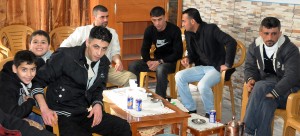At 25 years of age, he has spent nearly a quarter of his life in prison. Despite his tender age, he has the look of a man who has already seen too much. Sat in a plastic garden chair Aref looks into the near distance as he answers our questions. Surrounding him are his friends and family who have not seen him since his arrest 6 years previous. The room holds a feeling of collective cohesion, together they are strong, but alone I suspect anyone of them could fall apart. Six years ago, the Israeli Defence Force (IDF) took him from the his house in the middle of the night and he was charged him with possession of a weapon – a charge that he denies but for which he was found guilty.
I ask Aref about his experiences inside the four different Israeli prisons where he was kept. What he does not say tells a story in itself. His gaunt and clearly underfed body sits slumped in his chair as he struggles through his mind for details that he is not comfortable recalling. He was moved between different prisions after making formal complaints about the conditions in which he was kept. When I tentatively ask him to expand, he simply replies, “they were badâ€.
Aref has been a free man for only a few hours when we are ushered to his house. They wanted us to see a ‘good news’ story – a young man returned to his mother. What I heard and saw however was that of a life reduced to distant stares and painful memories.
Aref was detained inside of Israel despite living in the occupied Palestinian territory (oPt), this meant that he was cut off from his family. This is a clear violation of international law. As Malcolm Smart of Amnesty International said, “International human rights standards and international humanitarian law guarantee every person deprived of liberty the right to humane and dignified conditions of detention…and regular family visitsâ€. What Aref described to me was a breach of these rights.
His case, however, is not unique. 6 years is a standard punishment for being caught in possession of a weapon. Equally, Aref was just one of the 5,200 Palestinians from the West Bank – including East Jerusalem – and the Gaza Strip, who are currently detained in facilities run by the Israel Prison Service. The vast majority are detained inside Israel. For Aref, years went past where he was not allowed to receive any visitors at all.
I ask him, perhaps through naivety, if he suffered any physical punishment inside prison and for the first time in the meeting a flicker of life passes through his eyes as he snorts before muttering, “of courseâ€. There is an awkward silence as all we all stare at the floor – I feel embarrassed for asking such a crass question. Aref breaks the silence by explaining that he will never forget what happened to him inside prison. I do not have the nerve or inclination to ask him to expand.
His family around him are buzzing with excitement to see him again after all these years. Before I go, I turn to his mother and ask a question which I hoped would encompass the ‘good news story’ that we had come to see. I ask her what it feels like to have her son back. She looks at me and smiles as a tear forms in the corner of her eye and she says in clear English, “very happyâ€. My professionalism drops and I meet her smile.
On the way out, Hassan who had arranged the meeting for us moves the conversation onto the 7 other young men who were arrested last night. My heart sinks as I imagine each of their mothers sitting out the years waiting for their sons to be returned. Tomorrow we will try to meet with some of the families of those newly arrested.
This post was originally published by Steve Hynd on http://www.stevehynd.com. Steve is participating in the Ecumenical Accompaniment Programme in Palestine and Israel. You can support the work that Quakers carry out for  EAPPI at http://www.justgiving.com/eappi.
